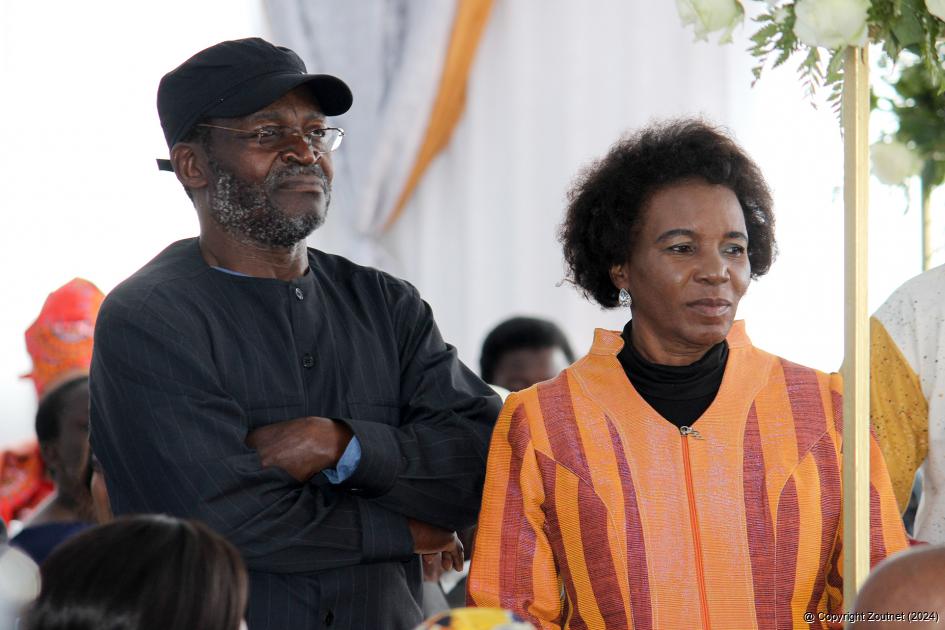

ADVERTISEMENT:

Mathatha Tsedu with his wife, Marubini Tsedu.
Centuries of oppression may have caused the violence
By Anton van Zyl and Bernard Chiguvare
Several high-ranking officials, traditional leaders, politicians and even a High Court judge attended a ceremony on Saturday (15 June) to celebrate the awarding of the Order of Ikhamanga (silver) to prominent journalist Mathatha Tsedu.
The event was held at the Pfamoni Royal Retreat and included a panel discussion by academics on the influence colonialism had on the manner in which black people perceive public property. The debate centred on the question of whether the behaviour of some black people to destroy public and private property is a result of mental slavery that had not been dealt with when freedom dawned in 1994.
Veteran journalist Mathatha Tsedu was honoured by President Cyril Ramaphosa on 25 April this year with a National Orders award. Ramaphosa mentioned that the Order of Ikhamanga was bestowed on South Africans who had excelled in the fields of the arts, culture, literature, music, journalism and sport.
According to the Presidency, Tsedu was honoured for “his excellent contribution to South African journalism and to journalism on the African continent, as well as his selfless contribution to the liberation of our country and continent. His mighty pen continues to be his weapon in the building of our democracy.”
During Saturday’s function, several of the speakers paid homage to Tsedu and his contribution to a new democracy for all of South Africa’s citizens. The programme manager was the very dynamic High Court judge, Justice Tshifhiwa Maumela.
Tsedu’s grandson, Mao Tsedu, explained to the guests what the National Orders entail. “National Orders build our nation and emphasise the values of achievement, excellence and acknowledgement of heroes and heroines,” he said. Mao Tsedu then quoted his grandfather, when the latter explained how he chose the pen instead of an AK47 to advance the struggle. “Those abilities leave us in awe; however, it also leaves us with big shoes to fill,” he said.
The guest speaker at the event was professor Tholene Sodi from the University of Limpopo. He told the guests that the debate was requested by Mathatha Tsedu. Tsedu felt that the celebration should serve to highlight the serious problem of destruction of facilities in various black communities, whether it be the burning of schools, vandalization of clinics, burning trains and libraries, and destruction of road infrastructure through bonfires on major routes.
“It is as if the people engaging in such destructive behaviour have a place or a planet somewhere which is their permanent home. In other words, it is like these individuals are just visiting our planet on a mission to destroy whatever they can,” said Sodi.
Sodi had a number of theories as to why the lack of respect for property got out of hand, taking it back to the arrival of the first settlers. “Our country became a settler colonial state which had to be maintained through brutal force and naked violence. Over a period of time, this brutality and violence became the norm, which got internalized by both the oppressor and the oppressed. In turn, this internalised brutality and violence resulted in deep psychological wounds and scars that have remained with us till today.”
Sodi argued that several ways existed to deal with the unresolved anger, self-hate and self-doubt. He suggested concepts such as emotional emancipation circles, where participants shared stories and deepened their understanding of the impact of historical forces on their sense of self-worth.
In South Africa, the Truth and Reconciliation Commission (TRC) provided an opportunity to deal with the psychological wounds and scars of the past. “It does, however, appear that the TRC process just opened wounds in some cases,” said Sodi.
The professor finished his speech by quoting Steve Biko’s words in his White racism and Black consciousness paper, where he said that black people need to highlight the fact that “…in pre-Van Riebeek days we had a high regard for people, their property and for life in general.”
“Simply stated, it is indeed possible even for people who have been oppressed for many centuries to be freed from all forms of alienation and the mental slavery. The solution lies with each one of us,” he said.
News - Date: 25 June 2019

Recent Articles
-

From sportscaster to advocate
21 April 2024 By Silas Nduvheni -

New lab welcomed by Bungeni learners
20 April 2024 By Thembi Siaga -

Rialivhuwa and Sally are king and queen
20 April 2024 By Kaizer Nengovhela -

'Headman demolished my house'
20 April 2024 By Kaizer Nengovhela
Search for a story:

ADVERTISEMENT


Anton van Zyl
Anton van Zyl has been with the Zoutpansberger and Limpopo Mirror since 1990. He graduated from the Rand Afrikaans University (now University of Johannesburg) and obtained a BA Communications degree. He is a founder member of the Association of Independent Publishers.

ADVERTISEMENT:



